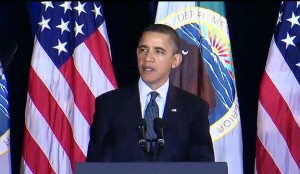 With President Barack Obama’s announcement that the United States will “lend its support” to the UN Declaration on the Rights of Indigenous Peoples (UNDRIP), the U.S. has at last joined the global consensus on this critical human rights issue.
With President Barack Obama’s announcement that the United States will “lend its support” to the UN Declaration on the Rights of Indigenous Peoples (UNDRIP), the U.S. has at last joined the global consensus on this critical human rights issue.
In a decision that reverses the position taken by the Bush administration in 2007, when the U.S. voted against endorsing the declaration even as 145 nations supported it, the Obama Administration acknowledged the importance of this decision, which Indigenous, human rights and environmental organizations and activists in the U.S. have been working towards for over 30 years.
At the White House Tribal Nations Summit, Obama said, “The aspirations [UNDRIP] affirms, including the respect for the institutions and rich cultures of Native peoples, are ones we must always seek to fulfill. . . I want to be clear: what matters far more than words, what matters far more than any resolution or declaration, are actions to match those words.”
So by lending its support to UNDRIP, just what kind of actions can we expect the U.S. to take? That remains to be seen. As Indigenous rights organization Cultural Survival points out, Obama said that the White House would release an official statement on the declaration, and until that statement is released it will be difficult to know whether his endorsement is qualified, as were those of New Zealand and Canada, or a full-fledged endorsement of UNDRIP core principles, which include:
- The right of Indigenous Peoples to live on and use their traditional territories;
- The right to self-determination;
- The right to free, prior, and informed consent (known as FPIC) before any outside project is undertaken on their land;
- The right to keep their languages, cultural practices, and sacred places;
- The right to full government services;
- And the right to be recognized and treated as peoples.
Let’s hope for a full endorsement of these principles and “actions to match.” As many Indigenous leaders are saying, the U.S. supporting UNDRIP is something to celebrate, but much work remains to be done.